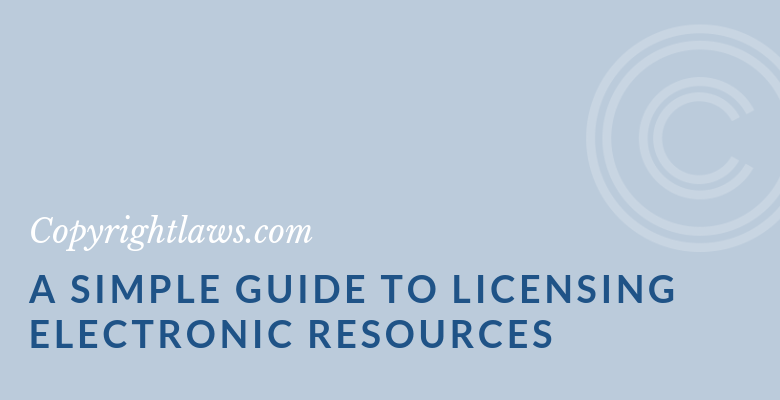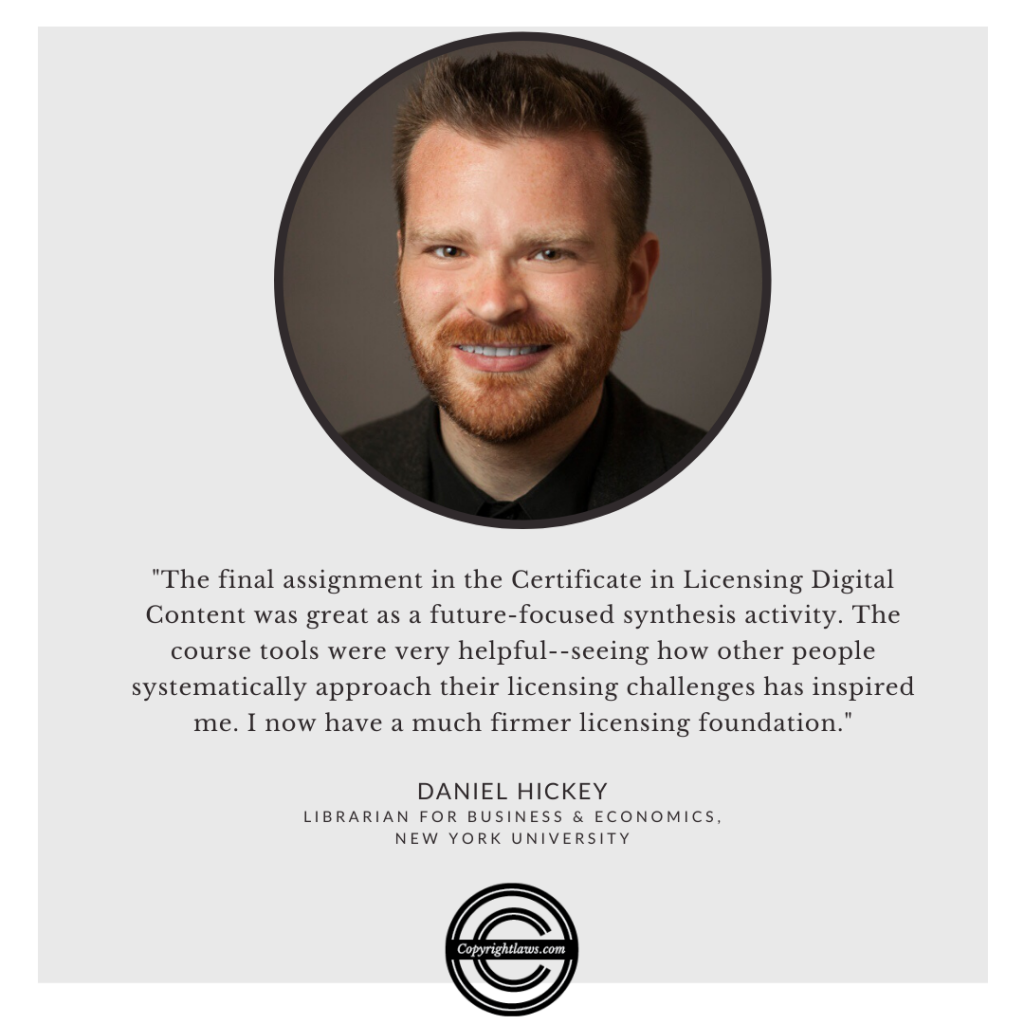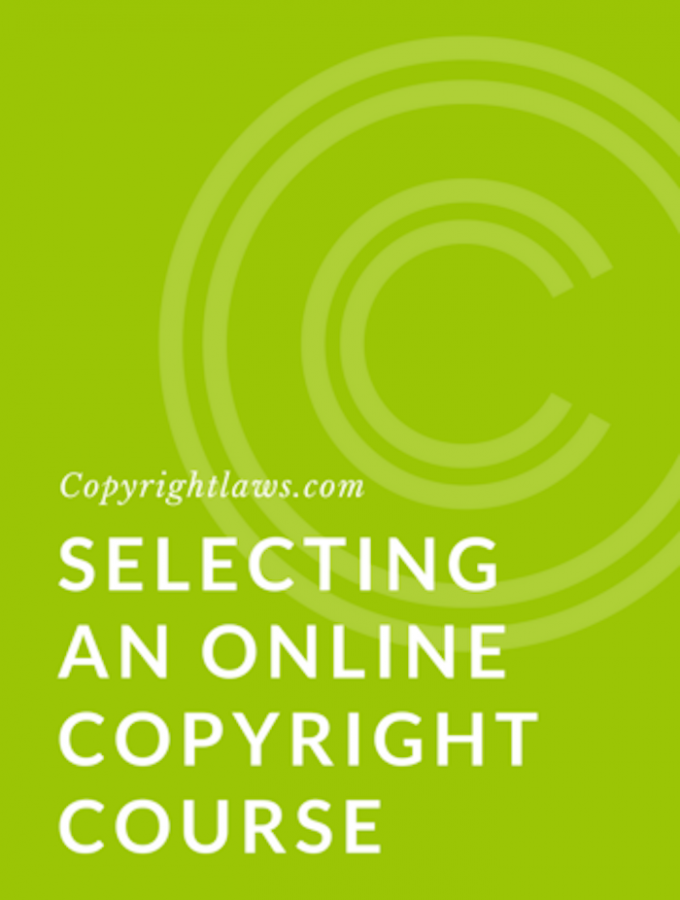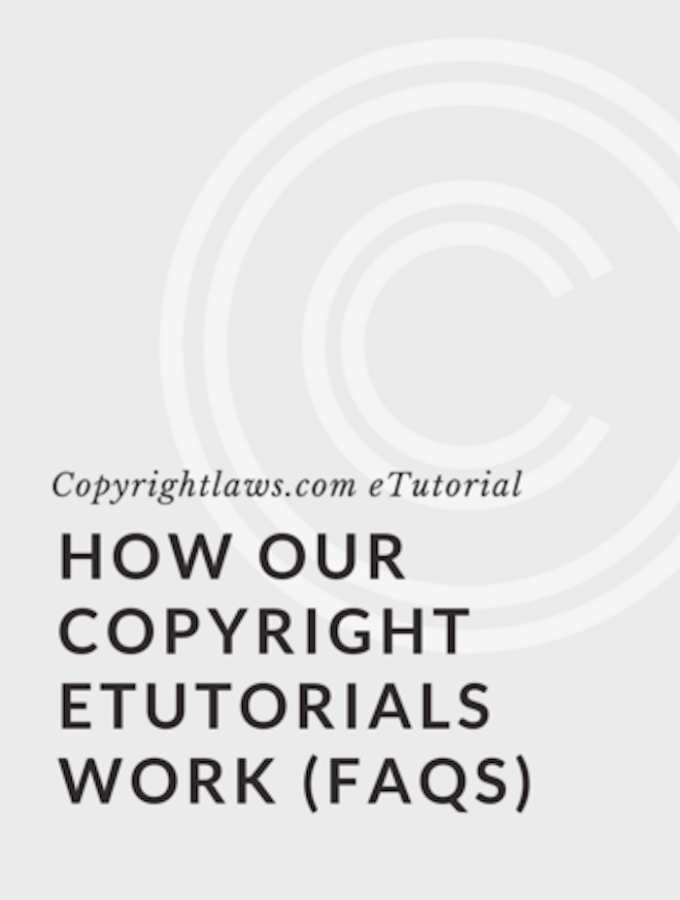
Licensing electronic resources or e-resources requires many skills. Do you have the skills to handle the acquisition of electronic resources and the related digital content licensing issues in your library or organization? Skills include:
- Understanding licensing language
- Negotiating licensing agreements
- Legally using licensed content
This article guides you in dealing with your licensing issues with confidence by:
- Addressing licensing frustrations
- Debunking licensing myths and misconceptions
- Providing short, practical answers to questions
We invite you to join us in our comprehensive online licensing course
in which you'll receive a Certificate in Licensing Digital Content.
Scroll to the end of this article to download tips and
information on licensing e-resources in our guide
8 Essential Tips to Licensing Electronic Resources.
Quick Navigation to A Simple Guide to Licensing Electronic Resources
- Common Frustrations When Licensing Electronic Resources
- Education and Experience Lead to Confidence in Addressing Licensing Issues
- Monitoring Use of Licensed Digital Content
- Licensing Myths and Misconceptions
- Questions and Short Practical Answers About Licensing Electronic Resources
Licensing electronic resources is now an everyday occurrence in libraries and resource centers. Some librarians and information professionals are comfortable dealing with license agreements, from negotiating to interpreting them. Others prefer these contracts be the responsibility of lawyers.
Throughout your dealings with licensing issues, keep in mind that you’re not a lawyer and don’t provide legal advice or opinions. We explore the divide between lawyers and librarians (and other nonlawyers) when it comes to copyright and licensing issues in A Simple Guide to Copyright for Librarians. See all of our free downloadable Simple Guides to Copyright.
Common Frustrations When Licensing Electronic Resources
Digital content and its licensing has changed the nature of how you acquire content. It also affects the experience of end-users who must abide by the terms and conditions of licensing agreements. You may experience various frustrations with licensing electronic resources, such as:
- Entering into legal agreements just to access content for your “shelves” rather than merely purchasing print books
- Feeling like you’re in the role of a lawyer when you're not a lawyer
- Discovering that agreements that were perfectly fine at the time of signing have become outdated due to rapidly changing technology or new ways to access and use content
- Monitoring electronic uses of content, whereas patrons can freely roam your print bookshelves without the same restrictions
- Spending money and time not only to negotiate licenses, but also to educate yourself about licensing digital content, none of which is needed when acquiring print materials
- Being unable to archive (or experiencing ambiguity about archiving) electronic materials you could previously keep on bookshelves indefinitely or until destroyed or obsolete
We provide strategies below to help you get over these and other frustrations.
Education and Experience Lead to Confidence in Addressing Licensing Issues
With education and experience, librarians and information professionals can become as comfortable addressing licensing issues as carrying out other parts of their roles. The following are actions you can take immediately to increase your comfort level with digital content licensing:
- Read as many different licenses as you can access
- Follow developments in copyright law, court cases and treaties, as copyright and licensing issues are closely linked (for the most part, you're licensing copyright-protected materials)
- Familiarize yourself with your organization’s digital licensing and copyright policies, which may stand alone or be part of a broader intellectual property policy
- Discuss license requirements internally (for example, how you use licensed content and who uses it)
- Educate yourself about digital license agreements
Areas you need to understand include:
- The interplay of copyright and contracts when licensing electronic resources
- Commonly used license terms and conditions
- Interpreting license agreements and identifying your enterprise’s unique needs
- Educating end-users about how to legally use licensed content
- Negotiating the best possible license agreements for your library or organization (and learning general negotiation skills)
- Skills to manage multiple digital content licenses effectively
Monitoring Use of Licensed Digital Content
Once you’ve completed the negotiation process and signed the agreement to use the electronic content your organization needs, you may feel your job is done with respect to the digital license. That’s not the case, however. It’s important to ensure users are using the content in accordance with the terms and conditions of your license.
How can your enterprise effectively monitor the use of licensed digital content? Your license agreement is your first stop.
Most everything you need to know about the legal use of your digital content is in your license. Read it. Specifically, examine the following:
- The sections on who is an authorized user
- What are authorized uses
- All the licensee (library or organization) obligations with respect to monitoring use of licensed content
Who May Access the Content?
Your license agreement will set out who’s an “authorized user” of the content. This may be all employees in your organization, and it may also include consultants and part-timers.
If your organization has its headquarters in one city or country and other employees in offices or working remotely in other cities or countries, then it’s likely these others are authorized users and have been included in your written agreement.
If the public accesses content from your enterprise’s website, including licensed content, make sure this is permitted in your license.
Can You Redistribute Licensed Content?
Can your enterprise create handouts for a conference using the licensed content? How about including articles found in the licensed content in a research paper to be distributed to the public? There are at least three sections in your license that you will want to review to answer these questions.
- Rights Granted — First, the section of your license on “rights granted” sets out what rights you have in the licensed content. May you email a copy of a licensed article to yourself? Are you permitted to include copies of articles in course materials? May you share an article with a client?
- Usage Restrictions — Examine the section in your license on “usage restrictions” to ensure your use is legal. For example, the license may restrict substantial or systematic copying, or modifying or altering the content.
- Informing Your End-Users — After signing a new agreement, it may be helpful to post a summary of its terms and conditions in a place where those accessing the licensed content can easily view it. To go further, you could ask authorized users to sign a notice agreeing to the accepted uses before they can access the content.
As a general precaution, you may want to educate those who access and use your licensed content about how to spot illegal usage. You may ask them to notify those in charge by way of an internal reporting form if they suspect illegal usage.
Safeguards
Monitoring use of digital content involves several steps. Some safeguards include the following:
- Each reproduced article states the content owner’s name and email address along with a copyright notice or warning.
- Whenever an end-user accesses licensed content you should explicitly warn them about copyright law and license agreements. You can do this by posting a copyright notice near a computer terminal. Or for remote access, a copyright notice should appear prior to granting access to the content.
- Your library should make information on copyright law and license agreements easily available through links to relevant websites and by having an in-house library of relevant sources.
- Where feasible, summaries of license agreements as well as the agreements themselves should be available to authorized users.
Licensing Myths and Misconceptions
Your licensing skills should start with identifying and debunking digital licensing myths and misinformation. Start with the following common misconceptions about licensing electronic content.
Myth #1. Not all licenses are negotiable
Although some clickthrough and online digital licenses may not allow room for negotiating terms that fit your needs, most other licenses are negotiable. When a license for a new database or electronic periodical lands in your email inbox or on your desk, look at its wording (terms and conditions) with a critical eye. You need to consider:
- Does the license fit your needs or should you ask for changes to be made to the terms and conditions of use?
- How would you change it?
Approach your licenses as if they're negotiable. But don't just assume the vendor, publisher or licensor is going to ask what terms you’d like to negotiate. It's up to you to let the other party know you'll be negotiating the terms and conditions they offered to meet your needs and those of your end-users.
Only sign and accept a license arrangement that works for you in your particular circumstances.
Myth #2. Licenses must be in "heretherewithto" language
Whenever you can, use plain language in your agreements and avoid technical or legal language. Say what you mean and put that in writing. If the language is unclear, ask the licensor for an explanation. Define any unfamiliar or ambiguous terms in the license itself.
Myth #3. I need a lawyer
Don't be intimidated by not having continuous access to a lawyer. If you're working with licensing for e-resources on a daily basis, you likely know more about licensing than you realize. Consult an in-house or external lawyer on an as-needed basis.
Myth #4. Renegotiating every year is mandatory
Negotiating is time-consuming and costly. At the same time, technology is changing rapidly and so is the way we all use digital content. As a result, lengthy durations for license agreements may not be appropriate, so consider an automatic renewal clause. However, you don’t want to include an automatic renewal clause without both of the following conditions:
- Both parties are satisfied with how the license is working out for them
- Each side has an opportunity to positively opt into the renewal
What's considered an ideal license duration? This is subjective, but one- to three-year terms are popular. Again, think about what license duration works for you. Look at your previous licenses and see what durations have best met your organization's needs and uses of licensed content.
Myth #5. You can control your end-users
The license agreement you sign is between you and the licensor. Your license only contractually obligates you and the other party. As such, you shouldn’t agree to police subsequent users of that content. However, you may wish to educate staff and researchers about legally using licensed content. In fact, your license may obligate you to do so.
Myth #6. You may restrict fair use or fair dealing
Parties to a license may agree to limit fair use or fair dealing as part of the agreement. If the license restricts fair use or fair dealing and that doesn't work for you, speak up and let the licensor know.
Be aware that others who aren't party to the license (called "third parties") aren't bound by the agreement between you and the licensor. Third parties may apply the relevant copyright law to their use of the licensed content, including fair use or fair dealing.
Myth #7. Standard licenses are the answer
Each situation is unique. Model or standard licenses may seem like the answer to avoid costly and time-draining negotiations. However, always look at your particular situation and find an arrangement that's suitable to your needs.
You may want to use model licenses as education tools and also as checklists to ensure that your licenses address important and relevant issues.
Myth #8. One side always loses in negotiations
In the ideal world, negotiations should be "win-win," with both parties satisfied with the end result. This, of course, isn't always possible. You should be prepared before entering into negotiations. By knowing both your needs and those of the other party, you'll be closer to finding an agreement satisfactory to both sides.
Questions and Short Practical Answers About Licensing Electronic Resources
The following are questions and situations about digital content licensing that librarians and information professionals have shared with Copyrightlaws.com. Our short practical responses are intended as guidance.
As always, please don’t rely on our answers as legal advice or opinions. Contact an attorney should you require legal advice or a legal opinion.
General Licensing Concepts
What would a “perfect” digital license contain?
There's no such thing as a perfect license. Although some model licenses are available, each situation is unique. You must ensure that each of your licenses reflects the requirements of your library and the licensor. The “perfect” digital license would be one that sets out terms and conditions that satisfy both parties.
Are a license and an assignment the same thing?
No. A license is mere permission to use content according to specific terms and conditions. An assignment is an outright purchase of the rights to that content. Most content used by libraries is licensed.
Must all licenses be in writing?
They should be. This isn't always necessary, but it’s a good idea since a written license summarizes your negotiations. It also constitutes a single document setting out the terms and conditions of use of the licensed content. Note that U.S. state law and Canadian provincial law have various requirements regarding when a legal agreement must be in writing.
What if the vendor doesn't provide a written agreement?
If a license isn't available, ask the licensor to set out the terms and conditions of use of the content in a letter to you. This way you'll have a record of the nature of the license. Alternatively, your library could develop a standard license agreement to send to licensors in such situations.
A publisher has provided a license that contains hyperlinks to separate documents addressing overarching terms and conditions. We don’t know when changes are made to these items.
All terms and conditions of a license should be spelled out in the license itself or in its appendixes, so both parties fully understand what they are agreeing to. Ask for a single document to act as your license. Don’t accept a “piecemeal” license that may be confusing with contradictory parts. This also benefits future administration and interpretation of the license agreement.
Specific Licensing Questions
Which country’s laws apply to a licensing agreement between a licensor in the U.K. and a licensee in the U.S.?
It's best if the licensing agreement specifically states which country’s laws govern the license. Like all clauses in a license, this may be a matter of negotiation between the licensor and licensee. It's always best (though not always possible) to have your own country’s laws govern your agreement, as you and your lawyer are familiar with them.
Some U.S. enterprises, including U.S. state bodies, can't sign agreements subject to the laws of a different jurisdiction than their own. However, they may agree to not address the issue of jurisdiction in an agreement. If your library or organization permits this, omitting the mention of jurisdiction may be a compromise solution.
How do I determine what rights should be set out in a license agreement?
You need to determine how the content will be used, then ensure the license reflects these uses. Consult various people in your organization, from your lawyer to your researchers, consultants and librarians to determine your needs prior to your license negotiations.
How do you define “commercial use” or "nonprofit use” in a digital license agreement?
There are no guidelines for exact definitions of these and other terms in a license agreement. The parties signing the agreement need to agree on the wording of any definition. Take the time to discuss and define these and other terms as they relate to the scope of permissible uses under the agreement. Begin your definitions with a dictionary definition of each term, then modify that definition to meet your needs.
I believe that interlibrary loan of licensed content is covered under fair use, yet the language in many licenses is restrictive and prohibits this necessary activity. How can we enable libraries to practice ILL without violating agreements?
If ILL is important to your library, you should negotiate an ILL clause with the licensor. Should the licensor not agree to terms that work for you, you may need to consider finding a different licensor for the content you need, if possible.
Is text and data mining permitted under licenses for electronic databases?
Review the terms and conditions in the license to see if text and data mining is permitted or specifically excluded.
If an article has a Creative Commons (CC) license, does that mean we may freely reproduce the article?
No, you need to read the CC license. Different CC licenses allow different uses, from unlimited use of a work to very limited use of a work without authorization from the licensor.
This article was written by Lesley Ellen Harris, author of Licensing Digital Content: A Practical Guide for Librarians, Third Edition.
If the form above doesn't work, please follow this link to sign up.
Do you want to ...
- Learn the lingo involved when licensing electronic resources?
- Gain practical skills for negotiating and managing your license agreements?
- Gain confidence in legally using licensed content?
If so, see our online course on Licensing Digital Content.




